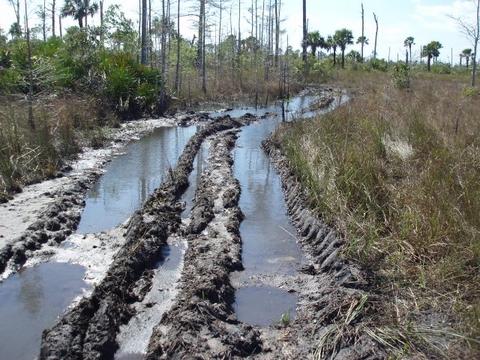If you've got time tomorrow afternoon, you might want to pull up the live feed from a congressional hearing examining off-road vehicle use on public lands.
The hearing is set for 2 p.m. Eastern before U.S. Rep. Raul Grijalva's Natural Resources Committee, Subcommittee on National Parks, Forests and Public Lands. It's titled, not so subtly, "The Impacts of Unmanaged Off-Road Vehicles on Federal Land."
Among the speakers scheduled to testify are the deputy director of the U.S. Bureau of Land Management, the deputy chief of the U.S. Forest Service, the executive director of the National Off-Highway Vehicle Conservation Council, and a host of others. In light of recent ORV news streaming out of Big Cypress National Preserve and Cape Hatteras National Seashore, I am a bit surprised that no representatives from the National Park Service have been asked to testify.
Nevertheless, there will be plenty for the congressfolk to talk about with the current agenda.
According to Jack Gregory, a retired law-enforcement ranger for the Forest Service, "irresponsible off-roading has become such a menace that it is now the single greatest threat to American landscapes."
His take on that stems from damage to forest streams, wetlands, ravines and meadows. According to a release from Public Employees for Environmental Responsibility, out-of-control ORV use has led to forest fires caused by hot engines coming in contact with dry grasses, drug smuggling and trafficking in illegal aliens, and growing numbers of injuries, particularly to young, untrained riders.
As with any activity, the actions of a few often wind up smearing most participants. The same scenario plays out with any motorized recreation, and even some non-motorized, activities.
To pick up the live feed of the hearing, head to this site and follow the link in the left-hand column.




Comments
I definitely agree with Jack Gregory's (retired law-enforcement ranger for USFS) statement:" irresponsible off-roading has become such a menace that it is now the single greatest threat to the American environment". You can just see this about anywhere in the American landscape: from majestic mountains, to the expansive deserts, to are fragile wetlands and to are beautiful coastal beaches...a pitted chewed-up landscape from extreme excessive usage from reckless ORV drivers. Such disrespect for these special places tends to portray us as society of reckless irresponsible stewards of the land...or poor custodians of the earth if you will. Matthew Schwartz's photo caption for this article speaks well for my comments.
Personally, I feel ORVs are a bigger danger to the parks than guns. They damage the flora, muck up the trails, and increase erosion. They're noisy and they disruit & scare off the wildlife.
A gun-toter can still responsibly enjoy the parks and not threaten anyone or anything. There is practically no responsible use of ORVs in the NPS, outside of campsites & roadways.
========================
My travels through the National Park System: americaincontext.com